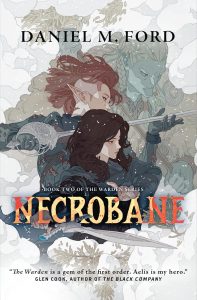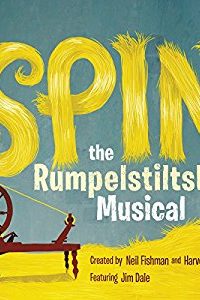Liz Bourke Reviews Necrobane by Daniel M. Ford
 Necrobane, Daniel M. Ford (Tor 978-1-25081-568-2, $28.99, 304pp, hc.) April 2024.
Necrobane, Daniel M. Ford (Tor 978-1-25081-568-2, $28.99, 304pp, hc.) April 2024.
Speaking of romps, Daniel M. Ford’s Necrobane, sequel to 2023’s The Warden (which concealed much entertainment behind its bland title), is a classic adventure in the sword-and-sorcery mode. It follows The Warden in style, tone, and content, and opens directly after The Warden’s striking cliffhanger.
A Warden is part magistrate, part law enforcement, part general magical troubleshooter, and part first line of defence. Aristocrat Aelis de Lentis, a city creature by habit and preference, is Warden for the isolated frontier village of Lone Pines. Warden is a prestigious position, appointed by merit. Aelis is determined to be a good one, at least in part on account of never seeing a challenge she didn’t want to take on and prove herself the better of. She’s almost as competent and as good at thinking on her feet as she thinks she is – which is fortunate, because she’s not particularly good at making sensible plans. A main character who rushes off headlong to do the thing, confident in their ability to improvise, but never improvising so well that they don’t get themselves into some other form of trouble, is definitely one way to make sure the pacing never slackens…
In the course of investigating a necromantic crypt, Aelis accidentally managed to unlock all the other hidden crypts in the former territory of Mahlgren. Mahlgren was once entirely part of Aelis’s nation of Ystain, but it has been partly ceded to the neighbouring orcs on foot of a lengthy war, settled in recent decades. Releasing an army of the undead into this unprotected backwoods borderland is both a big problem for the people who live there and potential cause for a serious diplomatic incident. Aelis has to find a solution to the problem she inadvertently caused, and fast. Undead armies are usually controlled by a key or talisman: If she can find that, everything will be fine.
Unfortunately, hunting for such a talisman in one of the decades-abandoned crypts in the middle of the wilderness, in winter, isn’t exactly a straightforward or easy prospect. And Aelis is resorting to rather inadvisable magical interventions in order to maintain her mobility after injuring her ankle: She doesn’t think she can afford to wait. In company with her lover, restless and itchy-footed half-elf inventor Maurenia; Timmuk, Maurenia’s friend, the scion of a dwarven banking house turned treasure-hunter; and Tunbridge, a half-orc were-bear tracker with a mysterious and well-educated past with whom Aelis formed an unexpected friendship, Aelis sets out with a perhaps not entirely warranted confidence in her ability to solve the problem without making anything worse.
Monsters, curses, binding oaths, flooded crypts, and ancient, powerful sources of necromantic power all come together in a narrative that drinks deeply from the same well as the likes of Dungeons and Dragons: Honor Among Thieves and Kelly McCullough’s Fallen Blade series. With a compelling voice full of verve and humour, and entertaining, well-rounded characters, the winter-weather (off-)road-trip delivers on its adventure promises in spades.
But success in Aelis’s quest comes at a cost: a trapped Maurenia, magically bound within the confines of a single valley thanks to Aelis’s carelessness. This is yet another problem for which Aelis needs to find a solution, but it’s not likely to be quick, or easy.
Necrobane doesn’t end here. Post-quest, with Maurenia left behind, Aelis and her remaining companions return to Lone Pines, to a fresh set of problems only loosely linked to the ones they’ve just survived. These problems include the lingering influence of a no-longer-precisely-human wizard, Daelis, who proved to be a dangerous antagonist in the course of The Warden. In an already episodic – indeed, almost picaresque – novel, this change of direction feels more like a short-story sequel than a natural climactic arc: the emotional trajectory of the reading experience, and of Aelis’s character development, is set at odds with the narrative’s change of focus. A strong emotional thread is left without much progress or resolution for several chapters leading up to Necrobane’s conclusion, and instead of resolution there, Ford instead ends with a teaser/cliffhanger for the next instalment of Aelis’s (mis)adventures.
This authorial choice, along with the story’s embrace of the picaresque, makes the reading experience more akin to the experience of a multiseason television serial, or a long-running tabletop RPG campaign. It’s a clever piece of work on Ford’s part, tying the Dungeons and Dragons tone and tropes together with an echo of roleplaying style, but bypassing a clear denouement leaves an absence rather like a missing tooth.
I’ve always enjoyed sword-and-sorcery stories. It’s a fantasy genre where competent people frequently get in over their heads in the course of doing their jobs, but where problems are rarely world-ending or nation-collapsing events. I enjoy Ford’s variant a great deal: it’s got good pace, a good sense of humour, and it avoids the (hetero-)sexism and orientalism so common in examples from the last century. It’s old-school fun made fresh and new by its modern sensibilities. If Dungeons and Dragons: Honor Among Thieves was a little too slapstick and didn’t have enough walking corpses to suit your tastes, but otherwise hit the spot, The Warden and Necrobane might be exactly your cup of tea. But a note of warning: I don’t advise reading Necrobane without having read The Warden first, not unless you enjoy being thrown in at the deep end of ongoing events.
This isn’t the kind of series where each new novel stands on its own, but one where, despite or perhaps because of its picaresque approach, the new instalment leans heavily on what has gone before.
Liz Bourke is a cranky queer person who reads books. She holds a Ph.D in Classics from Trinity College, Dublin. Her first book, Sleeping With Monsters, a collection of reviews and criticism, is out now from Aqueduct Press. Find her at her blog, her Patreon, or Twitter. She supports the work of the Irish Refugee Council and the Abortion Rights Campaign.
This review and more like it in the May 2024 issue of Locus.
 While you are here, please take a moment to support Locus with a one-time or recurring donation. We rely on reader donations to keep the magazine and site going, and would like to keep the site paywall free, but WE NEED YOUR FINANCIAL SUPPORT to continue quality coverage of the science fiction and fantasy field.
While you are here, please take a moment to support Locus with a one-time or recurring donation. We rely on reader donations to keep the magazine and site going, and would like to keep the site paywall free, but WE NEED YOUR FINANCIAL SUPPORT to continue quality coverage of the science fiction and fantasy field.
©Locus Magazine. Copyrighted material may not be republished without permission of LSFF.






